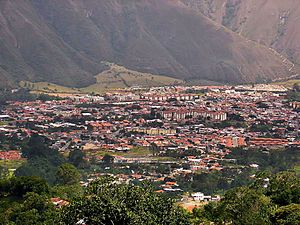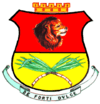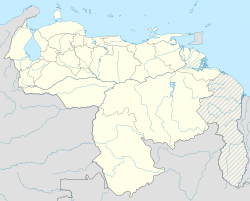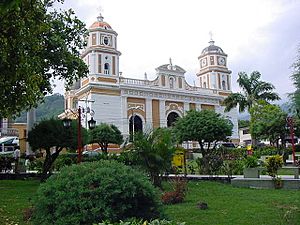Ejido, Venezuela facts for kids
Quick facts for kids
Ejido
|
|||
|---|---|---|---|
| San Buenaventura de Ejido | |||
 |
|||
|
|||
| Country | |||
| State | Mérida | ||
| Municipality | Campo Elías Municipality | ||
| Founded | 14 July 1650 | ||
| Elevation | 1,200 m (3,900 ft) | ||
| Population
(2011)
|
|||
| • Total | 99,837 | ||
| • Demonym | Ejidense | ||
| Time zone | VST | ||
| Postal code |
5111
|
||
| Area code(s) | 0274 | ||
| Climate | Aw | ||
Ejido (pronounced "eh-HEE-doh") is a town in the state of Mérida, Venezuela. It is the main town of the Campo Elías Municipality. Ejido was started in 1650 in an area where native Guayabas people lived. It quickly became a place known for growing cane sugar.
The town is very close to Mérida, which is the state capital. Ejido is part of Mérida's larger city area, which has about 350,000 people. You can easily travel between Ejido and Mérida using public transport, including the Mérida trolleybus system.
Contents
Ejido's Story: A Journey Through Time
The history of Ejido is closely linked to the history of the Mérida state and the Andean mountains in Venezuela. Let's explore how Ejido grew and changed over many years.
Ancient Times: The First People
- Indigenous Inhabitants: Before Spanish explorers arrived, the Andean region, including where Ejido is now, was home to different native groups. The Timoto-Cuica people were the main group.
- They were very skilled farmers. They used special methods like terrace farming and irrigation systems. These methods worked well in the mountains.
Spanish Arrival and Ejido's Founding
- Spanish Conquest: The Spanish began exploring and settling the Andean region in the mid-1500s. In 1558, Captain Juan Rodríguez Suárez founded the city of Mérida. This city became an important center for the Spanish.
- Establishment of Ejido: Ejido was founded in 1650 by Francisco de Cáceres. He helped set up many communities in the area. Ejido started as a farming community to support the growing city of Mérida.
- The name "Ejido" comes from a Spanish word meaning "common land" or "pasture." This shows that it was an agricultural area from the very beginning.
- Agricultural Development: The land around Ejido was very good for farming. The town became a hub for growing crops like corn, potatoes, and other vegetables. Raising livestock (farm animals) also became important for the local economy.
Becoming Independent: A New Nation
- Venezuelan War of Independence: In the early 1800s, Venezuela fought to become free from Spanish rule. This fight for independence affected the Andean region, including Ejido. Many local people joined the fight.
- Post-Independence Growth: After Venezuela became independent in 1821, many changes happened. Ejido kept growing as a farming center. It benefited from being close to Mérida, which became a key place for education and culture.
Growing Up: Modern Ejido
- Infrastructure Development: In the 1900s, Ejido saw many improvements. New roads, public buildings, and services were built. These changes made it easier to connect with Mérida and other parts of the country.
- Urbanization: In the second half of the 1900s, Ejido became more urban. More people moved there, and residential areas grew. The town changed from mostly farms to a more diverse urban center.
- Education and Culture: Ejido also benefited from the education and culture of nearby Mérida. Mérida is home to the famous University of the Andes (Universidad de Los Andes). The university helped the region grow in knowledge and culture.
Ejido Today: A Lively Town
- Economic Diversification: In recent years, Ejido's economy has become more varied. Farming is still important, but businesses and tourism have grown a lot. The town's markets, shops, and services serve both local people and visitors.
- Tourism and Natural Beauty: Ejido is located in the beautiful Andes mountains. This makes it a great place for tourists to visit. The town is a starting point for exploring natural places like the Sierra Nevada National Park. You can also enjoy hiking and other outdoor activities here.
- Cultural Heritage: Ejido keeps its strong cultural traditions alive. Festivals, traditional crafts, and local food are a big part of community life.
Ejido's history is a rich mix of native traditions, Spanish influences, and modern growth. From its start as a farming settlement, Ejido has become a lively town with a varied economy and a strong cultural identity. Its beautiful mountain setting continues to attract visitors and residents, making it an important part of Mérida state's heritage.
See also
 In Spanish: Ejido (Mérida) para niños
In Spanish: Ejido (Mérida) para niños





